
Are Elderberries Poisonous? Let’s Clear the Confusion
If you’ve ever wondered whether elderberries are poisonous, you’re not alone. That question gets asked a lot—especially by people trying to do things naturally or make their own elderberry syrup at home. The short answer? They can be poisonous if you eat them raw or prepare them the wrong way. But when handled right, elderberries are one of the most powerful natural immune boosters we’ve ever used in our family.
I remember when I first started experimenting with elderberries—back before I really understood how they worked. I read about all the benefits and just assumed they were safe no matter how you used them. Luckily, I learned quickly that cooked elderberries and products made from properly prepared berries are not only safe—they’re amazing for wellness. But raw elderberries? That’s a different story.
So, let’s break it all down in simple terms. We’ll look at what makes elderberries potentially poisonous, how to use them safely, and how my family gets the benefits without the risks.
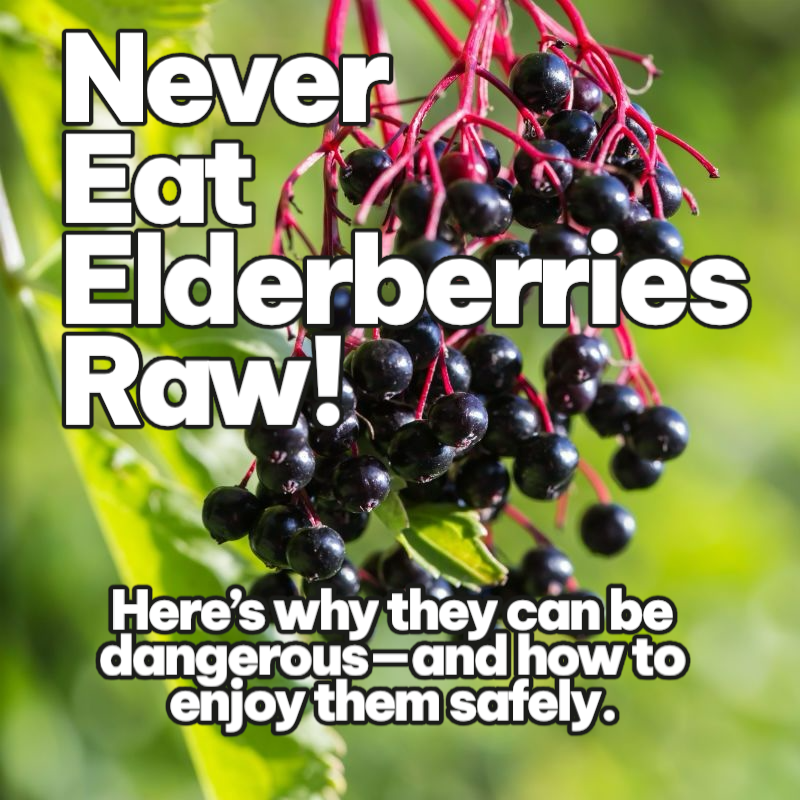
What Makes Elderberries Potentially Poisonous?
The issue comes down to a compound called sambunigrin. It’s a naturally occurring plant chemical that can convert into cyanide when metabolized in your body. Don’t worry—that sounds scarier than it is, but it is serious if you’re eating the wrong parts of the plant or not cooking them.
Sambunigrin is found in:
- Raw elderberries (especially unripe ones)
- Leaves
- Stems
- Roots
- Even bark
When you eat elderberries raw—especially in large amounts—it can cause some pretty nasty symptoms: nausea, vomiting, diarrhea, dizziness. That’s what people mean when they talk about elderberry poisoning. It’s rare, but it does happen. And that’s why you’ll see safety warnings about not eating the berries straight off the bush.
The crazy part is that once you cook elderberries properly (like boiling them while making syrup), that toxic compound is broken down and no longer a concern. Cooking makes elderberries safe and effective. But skip that step, and you’re playing with fire.

Raw Elderberries: Are They Safe to Eat?
Nope. Let me say that louder—you should not eat raw elderberries. Even if you see them growing wild in your area, they’re not like blueberries or raspberries that you can just pop in your mouth and enjoy.
Raw elderberries contain the same toxic compounds we talked about earlier—especially in the unripe green berries. People have made the mistake of using them in smoothies or tossing them into baked goods raw, thinking they’re just another superfood. Big mistake. Even a handful of raw elderberries can cause nausea, stomach cramps, and vomiting.
If you’ve ever searched “can you eat elderberries raw?”—now you know why the answer is a firm no. But once you boil them down for syrup or cook them into jelly, jam, or gummies, they’re completely safe and incredibly beneficial.
So if you’re making elderberry syrup at home, just make sure you simmer the berries for at least 45 minutes and strain out the stems. That simple process removes the risk and leaves you with nothing but the good stuff.
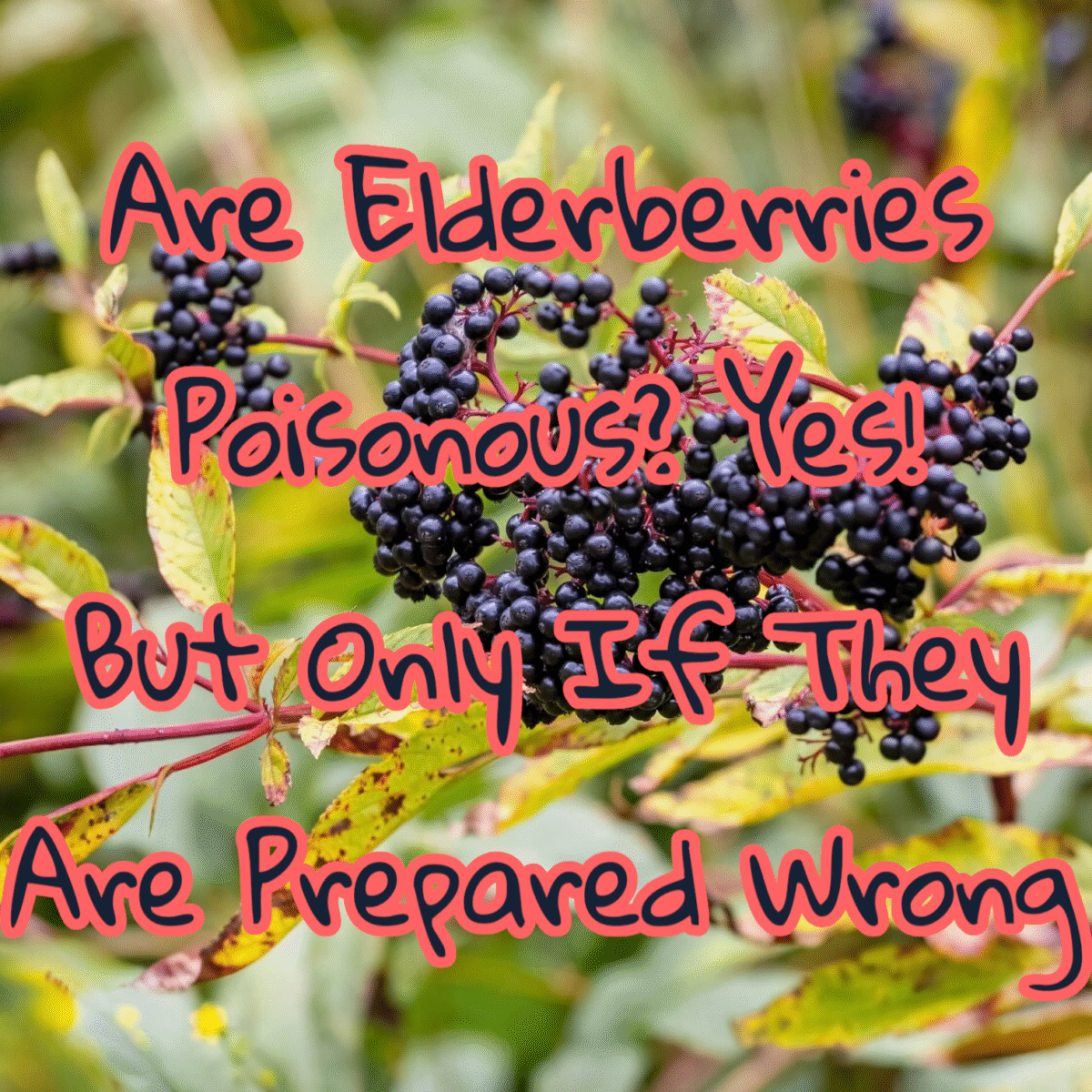
Which Parts of the Elderberry Plant Are Toxic?
Elderberries come from the Sambucus plant, and here’s the thing—not just the berries can be dangerous. Several parts of the plant contain toxic compounds, especially when raw. Here’s what to avoid:
- Leaves – The leaves of the elderberry plant have high levels of sambunigrin and are considered toxic.
- Stems – Whether it’s the thicker stems or tiny twigs that sneak into your harvest, they should be removed before any cooking or syrup-making.
- Roots – Definitely not for consumption.
- Bark – It’s not used in any common elderberry products and can be toxic if ingested.
- Unripe berries – These are especially high in harmful compounds and should never be consumed.
So what part is safe? The ripe berries—once they’re cooked. That’s the gold. That’s where all the antioxidant and immune-supporting power lives.
👉 And if you’re not into harvesting and cooking, there are plenty of ready-to-go elderberry products made the right way. For example, I personally trust and use this elderberry syrup and these adult elderberry gummies because they’re already prepared properly.
You can also check out our post on the children’s elderberry gummies my kids actually love if you’re shopping for your little ones.
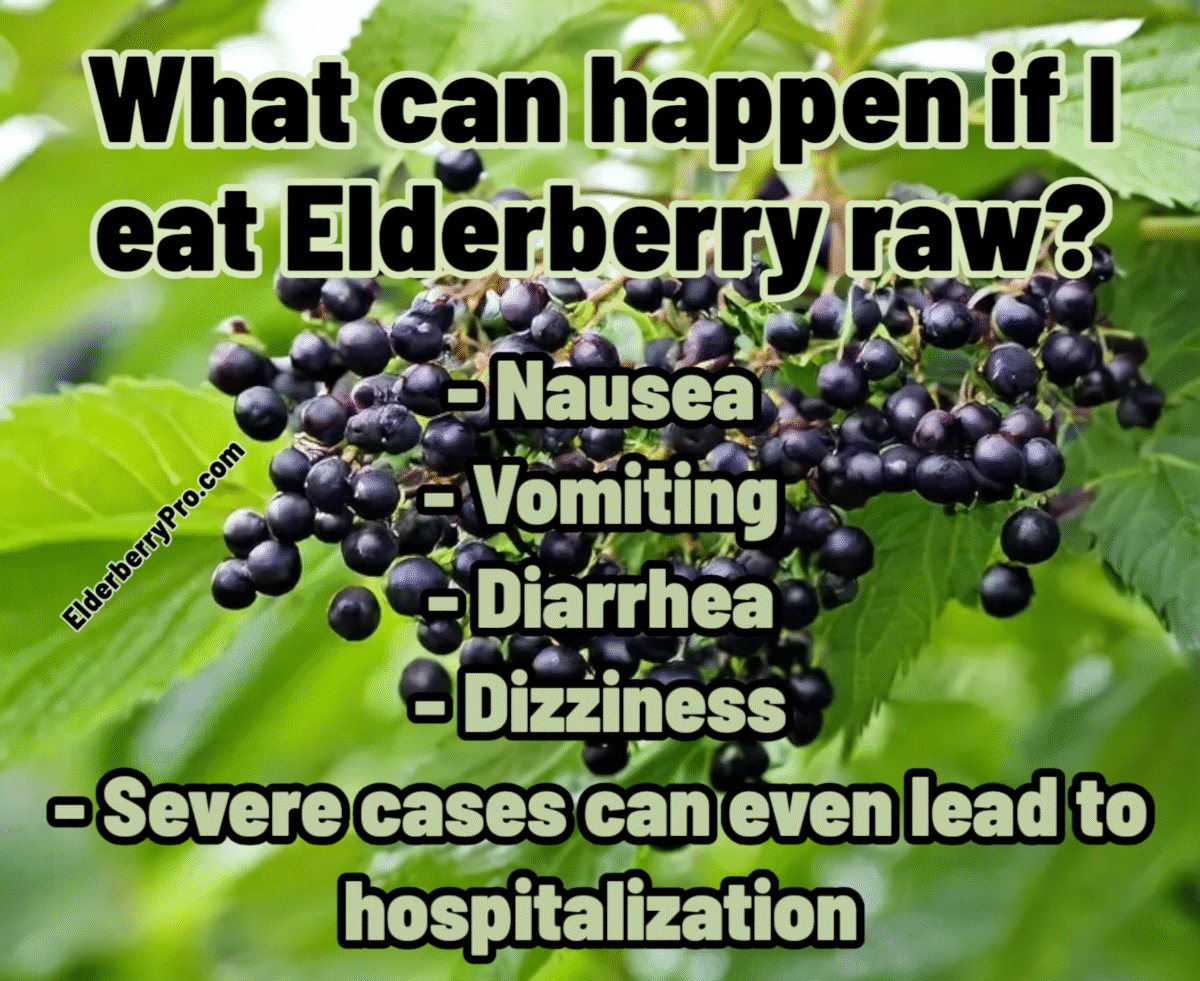
What Happens If You Eat Raw Elderberries?
If you or someone you know accidentally eats raw elderberries, you’ll usually feel it pretty fast. Most people report:
- Nausea
- Vomiting
- Diarrhea
- Cramps or abdominal pain
That’s because your body is reacting to the sambunigrin, which quickly converts into cyanide-like toxins. For most healthy adults, symptoms are short-term and clear up within 24–48 hours, but they’re still extremely uncomfortable—and totally avoidable.
In more severe cases (especially for kids or people with underlying health issues), it may require a call to poison control or a doctor. That’s why it’s so important to educate others about elderberry safety if you’re making your own syrup or products at home.

How to Prepare Elderberries Safely at Home
Making elderberry syrup at home can be rewarding—but only if you follow the correct preparation steps. Here’s the basic safety protocol:
- Use ripe berries only – Avoid green or under-ripe berries.
- Remove all stems and leaves – They carry the highest toxin risk.
- Simmer the berries for 45 minutes to an hour – This neutralizes the toxic compounds.
- Strain through cheesecloth or a fine sieve – Get rid of all solids.
- Store it properly – Glass jars with tight lids in the fridge are best.
Want a full, real-life guide to making your own? Check out our post: How to Make Elderberry Syrup from Fresh Elderberries

Is Store-Bought Elderberry Safe?
If you’re buying from a reputable brand, yes, store-bought elderberry is safe. Most products go through commercial heat processing that fully removes any risk of toxicity. Look for products that say:
- “Made from cooked elderberries”
- “Extract” or “concentrate”
- “Boiled elderberry syrup”
Brands like Viva Naturals Kids Gummies and trusted adult formulas like this elderberry syrup are created with those safety steps built in.
💡 Helpful tip: Always check the ingredient list. If you see “raw elderberry” or any questionable prep method—walk away.

Can You Eat Elderberries Straight from the Bush?
You can—but only if you like stomach cramps and regret. Seriously, even though they look like any other edible berry, elderberries are not safe to eat raw off the bush.
As someone who has harvested elderberries with my own hands, I can tell you it takes some effort to separate the good from the risky. You need:
- Time to pluck only the ripe berries
- Patience to clean and de-stem everything
- Knowledge to cook them correctly
But if all that sounds like too much—don’t worry. You can always go with the easier route and grab a trusted premade elderberry product that’s already prepared for you and your family.

Are Elderberries Toxic to Dogs and Other Pets?
Yes, elderberries can be very dangerous for dogs, cats, and even some livestock. Raw elderberries contain the same toxic compounds harmful to humans—only animals can’t always vomit or detox the way we do.
🐶 Dogs: Ingesting raw berries, leaves, or stems may lead to vomiting, diarrhea, seizures, or worse.
🐱 Cats: Even smaller amounts can lead to extreme digestive distress.
🐮 Livestock (like goats or cattle): Can become ill if they browse elderberry plants in a pasture.
👉 If you grow elderberry in your yard, fence it off or keep animals away. And if your pet accidentally snacks on some, call your vet immediately.
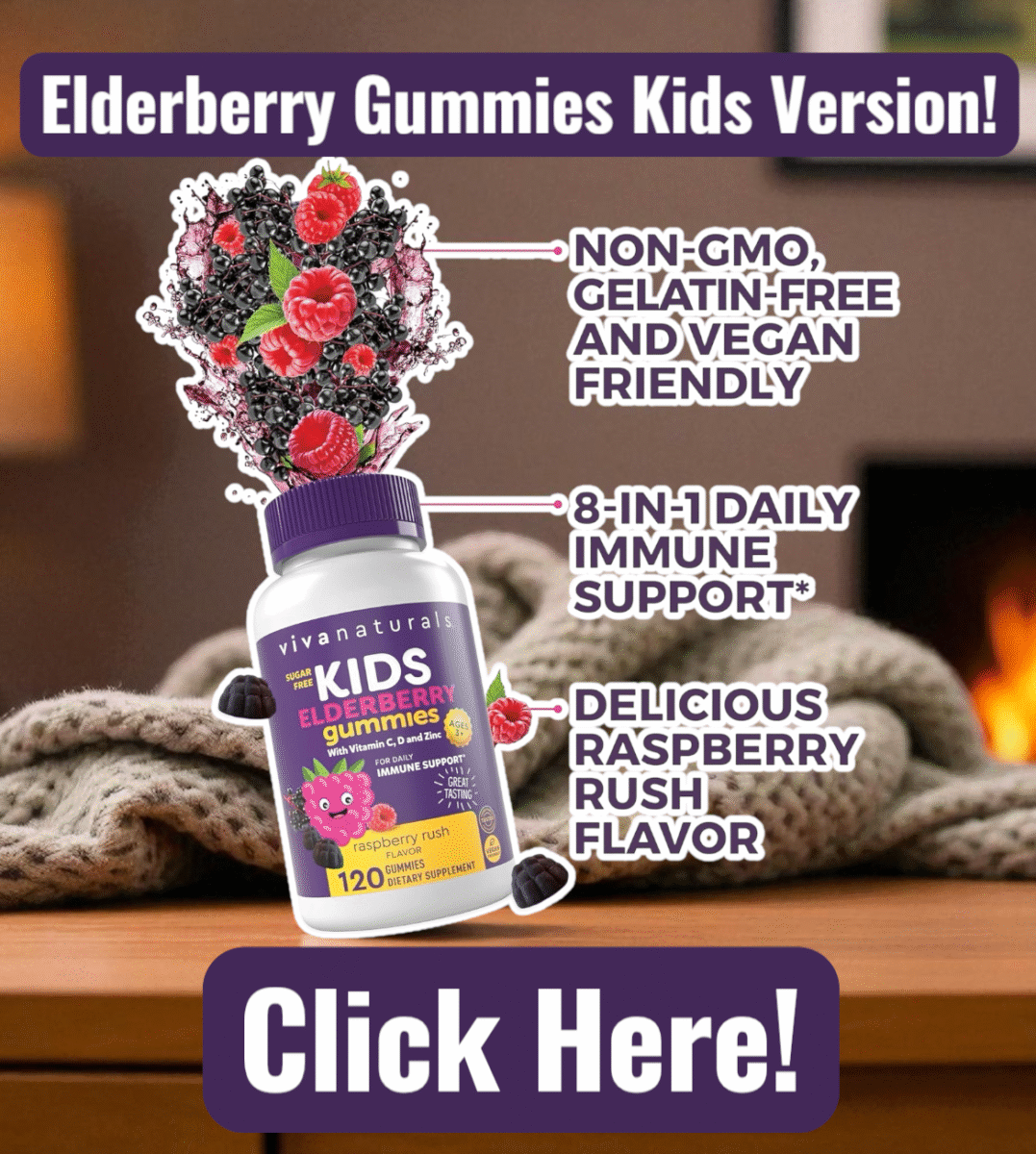
Can Children Safely Take Elderberry?
This is a big concern for parents—and rightly so. The key here is preparation.
✅ Cooked elderberry products, like syrups and gummies designed for kids, are safe and even helpful during cold and flu season.
❌ Raw elderberries, uncooked syrup, or DIY gummies made without cooking the berries? Nope—not safe for children.
That’s why I trust only vetted, sugar-free elderberry gummies for kids like the ones from Viva Naturals. These are:
- Pediatrician-reviewed
- Sugar-free and vegan
- Made with cooked extract, not raw berries
👉 See the kids elderberry gummies my children actually love
And for adults, check out our trusted favorites here:
👉 Top Elderberry Gummies for Immune Support

What Parts of the Elderberry Plant Are Toxic?
It’s not just the berries you need to watch out for. In fact, the most toxic parts of the plant are:
- Stems
- Leaves
- Twigs
- Roots
- Unripe (green) berries
These contain a higher concentration of cyanogenic glycosides, which release cyanide when broken down in the digestive system.
This means if you’re foraging or growing elderberries at home:
- Always de-stem thoroughly
- Cook every berry you plan to consume
- Never try to juice the entire plant
Elderberry Poisoning Symptoms You Should Know
So how do you know if someone’s experiencing elderberry poisoning?
Watch for these common signs:
- Nausea and vomiting (usually the first symptoms)
- Diarrhea
- Weakness or dizziness
- Confusion
- Shortness of breath (rare but possible)
Most people bounce back quickly if they’ve only had a small amount. But if someone eats a large quantity of raw elderberries or ingests leaves or stems, it’s time to:
- Call poison control: 1-800-222-1222
- Seek immediate medical care
Better safe than sorry.

How to Cook Elderberries Safely (Step-by-Step)
Worried about doing it wrong? Don’t be. Here’s how I personally prepare elderberries at home to keep my family safe:
- Remove all stems and leaves — They’re the most toxic parts.
- Rinse the berries thoroughly — Dirt and bacteria can hide in the clusters.
- Boil them for at least 30 minutes — This neutralizes the toxic glycosides.
- Strain through cheesecloth or a fine mesh sieve — Removes skins and seeds.
- Bottle and store properly — I refrigerate mine for up to a month or freeze for longer.
If you’re unsure or nervous, I get it. That’s why I often go with safe, pre-made elderberry products like the ones we’ve reviewed on the site. It saves time—and peace of mind.
👉 Learn how to make elderberry syrup from fresh elderberries
What the CDC and Health Experts Say About Elderberry Risks
You won’t find the CDC promoting elderberries the way they do flu shots—but they do caution against raw consumption.
According to public health sources:
- Raw elderberries can cause nausea and vomiting
- Children should never eat uncooked berries
- Home-prepared syrups must be thoroughly cooked
These warnings might sound dramatic, but they’re just being careful. In reality, most elderberry-related issues come from poor prep or DIY attempts gone wrong.
That’s why I personally don’t mess with shortcuts when I make mine—or I just go with trusted gummies or pre-made syrups.
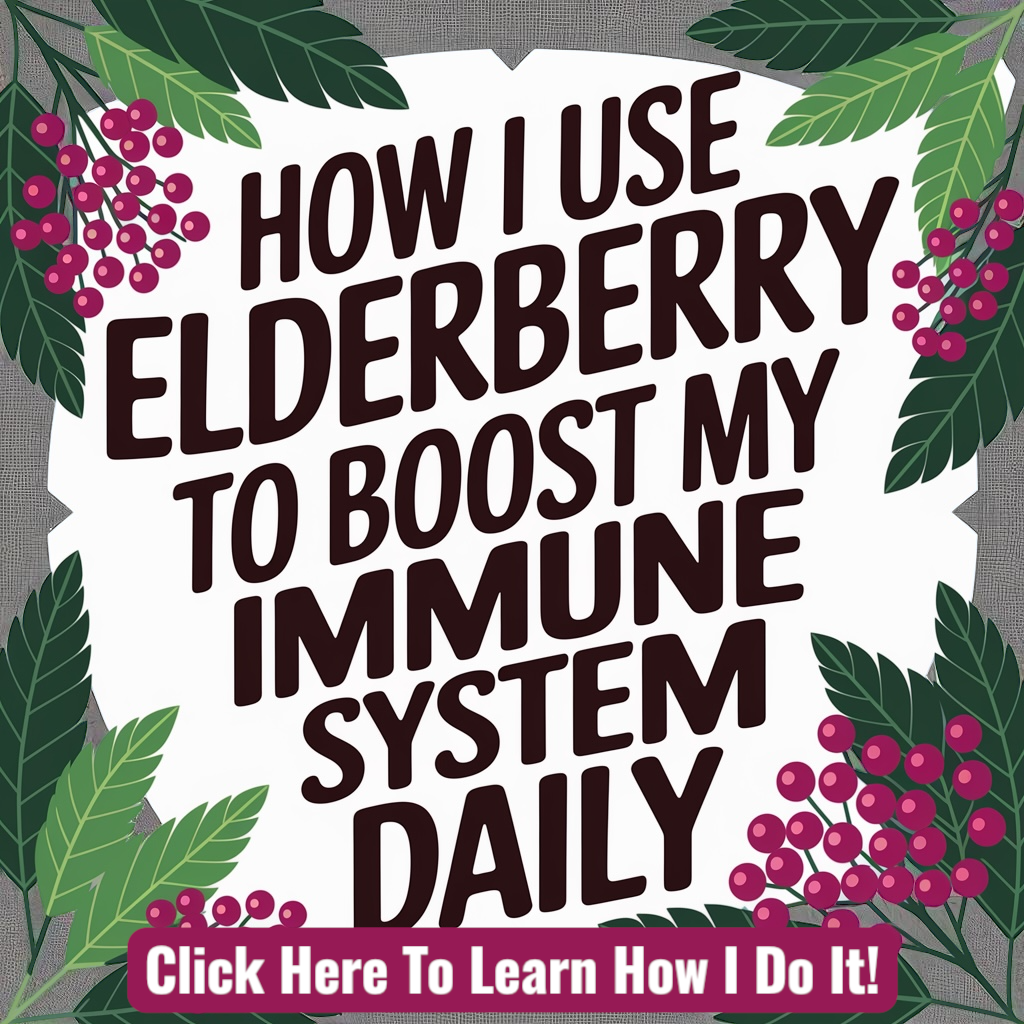
Are the Benefits Worth the Risks?
Here’s my honest answer: yes, as long as they’re prepared right.
Let’s break it down:
- 🛑 Raw elderberries: Risky. Can cause elderberry poisoning if not cooked.
- ✅ Cooked elderberries: Packed with antioxidants, flavonoids, and immune-boosting compounds like quercetin and anthocyanins.
- 🟢 High-quality elderberry gummies or syrups: The safest and most effective for daily use.
When you cook or buy elderberry products from trusted sources, you’re not just avoiding danger—you’re unlocking a powerful immune ally.
Elderberry Safety Tips Everyone Should Know
If you want to get all the benefits of elderberry without any of the risk, keep these tips in mind:
- Never eat raw elderberries – Always cook first.
- Avoid stems, leaves, and unripe berries – Toxic.
- Stick with proven recipes – No experiments when it comes to health.
- Use trusted brands – Especially for kids.
Need a safe place to start?
👉 Here’s my favorite elderberry gummy for kids
👉 And here are my go-to gummies for adults

Can You Eat Elderberries Raw? (What Actually Happens)
Short answer? No, you shouldn’t.
Even though they look like juicy little berries, raw elderberries—especially American varieties—contain cyanogenic glycosides, which can release cyanide in the body.
When people ask “can you eat elderberries raw?”, they’re often trying to shortcut their syrup or tea recipes. But the result can be:
- Nausea
- Diarrhea
- Vomiting
- Stomach cramping
- Dizziness
I’ve heard of folks saying they only ate “a few” and felt sick for hours. So yeah… just cook them or stick to something trusted like the Viva Naturals Elderberry Gummies for Kids or my go-to adult gummies.
The Most Common Myths About Elderberry Poisoning
Let’s bust a few of the biggest elderberry myths that still float around:
- “Only red elderberries are toxic”
→ False. All elderberries have toxic parts when raw—red ones are just more dangerous. - “I’ve eaten them raw and I was fine!”
→ You were lucky. Some people are more sensitive than others, and the toxin level varies depending on ripeness and species. - “Elderberries cure everything!”
→ Let’s slow down. Elderberries are awesome, but they’re not a miracle drug. When used correctly, they supportyour immune system—they don’t replace common sense or your doctor.

How I Safely Enjoy Elderberry Every Day
I love using elderberry, but not all forms are created equal. Here’s what I personally use and recommend:
- When I want full control, I use fresh elderberries from a trusted source and make my own syrup
- When I need quick and safe, I grab Viva Naturals Gummies for my kids
- For myself and my spouse, we both use these adult gummies
No boiling, no stressing, no risk of accidental tummy aches.

Our Final Thoughts: Are Elderberries Poisonous?
Yes—if raw, unripe, or improperly prepared. But don’t let that scare you away from this amazing fruit.
When elderberries are properly cooked or processed, they’re one of the most powerful immune-supporting ingredients out there. The key is knowing what not to do and sticking with safe recipes or quality products.
If you’re new to elderberry, skip the trial and error. Go with the safe route like I did:
👉 Try the same gummies my kids actually love
👉 Or grab the adult version that works wonders during cold season
As an Amazon Associate we earn from qualifying purchases through some links in our articles.